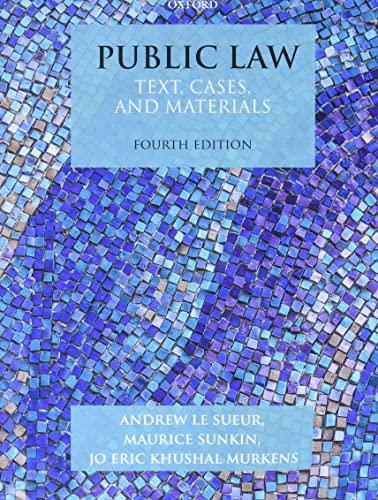Question
Analysis Assignment Part One: Michelle Smith has come to the firm with two sets of legal questions concerning recent business dealings. You have been asked
Analysis Assignment
Part One:
Michelle Smith has come to the firm with two sets of legal questions concerning recent business dealings. You have been asked to analyze the facts and offer your opinions about these matters. Part One: The first set of questions involves events that took place at a local restaurant that Michelle owns as a sole proprietorship. A few months ago, Michelle's older brother, Bruno, came to see her at the restaurant. Bruno had recently retired, but he found himself becoming bored without more to do, so he asked Michelle if she needed any help at the restaurant. Happily for Bruno, Michelle replied, "Sure. If you could put in a few hours each week to keep track of inventory and handle purchasing of things like silverware, glassware, etc., that would be great. I can't pay you anything, but you can play pool for free after your shift any time as long as there's an empty table." Bruno replied, "Sure, that sounds great! I can start tomorrow. "Michelle wanted to make work easy for Bruno, so she provided Bruno with a list of exactly what specific items to purchase from each vendor with whom he dealt, and she instructed Bruno not to buy any items that were not on this list. However, one day, one of the restaurant's vendors, with whom Bruno had transacted business on Michelle's behalf several times in the past, showed Bruno new catalog of "Platinum Collection" glassware. Bruno thought that these items would be great to use for the restaurant's VIP customers, and he orally agreed to make a single purchase of three sets of "Platinum Collection" glassware at $400 per set, with immediate delivery and payment to be tendered by the end of the month. Bruno put two of the three sets aside to use at the restaurant, and he took the third set home to sell to his neighbor, who happened to collect high-end glassware. His neighbor paid $900 for this set, and soto keep things fairBruno deposited $400 of this amount into the restaurant's purchasing account and kept the remaining $500 for himself. Unfortunately, the next day, another restaurant employee accidentally knocked over the table on which the other two sets of new glassware were sitting, and the contents were all destroyed. Bruno promptly threw the broken remains into the trash without telling Michelle anything about the unauthorized purchase, but Michelle learned everything when the vendor showed up a couple of weeks later to collect on the $1200 bill. Michelle believes that she should be excused from having to pay the vendor's bill for the "Platinum Collection" merchandise because her brother was not an "official", paid employee, and he did not have Michelle's permission to buy the high-end glassware. If neither of these defenses works, Michelle wants to know if there is any other legal way she can avoid paying this bill. She also wonders if she has any other recourse against her brother in this matter. Please provide your advice regarding Michelle's dealings with both the vendor and Bruno, stating in each case what legal rules or doctrines a court should apply when it addresses these questions and how the court would apply these rules to the specific facts of this case.
Part Two:
In addition to running her restaurant, Michelle also serves as president and one of a group of six directors of the Good Night Hotel Corporation (GNHC), which owns and operates a handful of local hotels. Acting in her capacity as president of GNHC, Michelle recently convinced the corporation's board of directors to approve the purchase of several paintings from Michelle's private art collection, which the corporation was going to place in the lobbies of the corporation's hotels. The paintings were worth only about $500 apiece, but Michelle sold each of them to the corporation for between $5,000 and $10,000. Before each sale, Karl, another member of the board of directors, asked Michelle whether the sale price was fair, and Michelle always replied that she had assessed the value of the painting to be sold to the corporation and that the sale price reflected the painting's fair market value. Karl had no idea that the prices Michelle was charging for the paintings were so dramatically inflated. Each time, the corporation's board of directors relied on Michelle's assurances, undertook no further inquiry, and approved the purchases. Eventually, one of the shareholders, who happened to be an art expert, saw one of the paintings in the lobby of one of the hotels. After asking questions about where it came from and how much it cost, the shareholder concluded that something was wrong, and she enlisted other shareholders of the corporation to join her in filing a shareholder derivative suit against the directors of the corporation. The shareholders seek money damages from the directors for breach of their fiduciary duties as directors of the corporation with regard to the transactions involving the paintings. Although Michelle is not very well-versed in legal matters, she has heard of something called the "business judgment rule," and she wants to know whether this rule will protect her and/or the other directors from liability in these circumstances. Please provide your answer to this question, again citing the legal rules that support your conclusions (for both Michelle and the other directors) and explaining how the rule applies to the facts of this case.
Step by Step Solution
There are 3 Steps involved in it
Step: 1

Get Instant Access to Expert-Tailored Solutions
See step-by-step solutions with expert insights and AI powered tools for academic success
Step: 2

Step: 3

Ace Your Homework with AI
Get the answers you need in no time with our AI-driven, step-by-step assistance
Get Started


